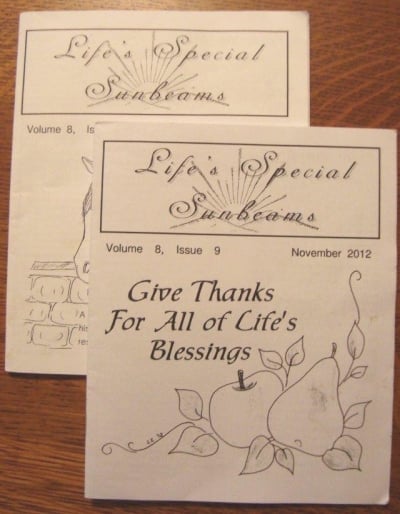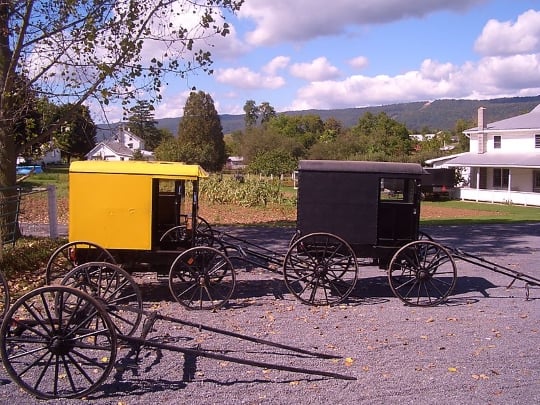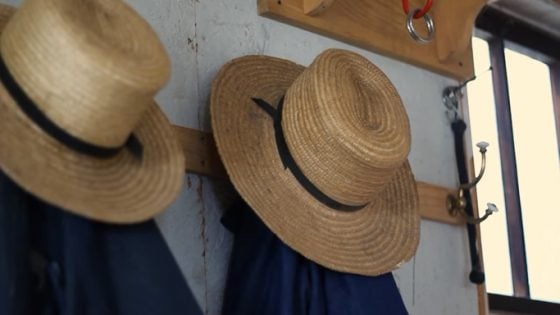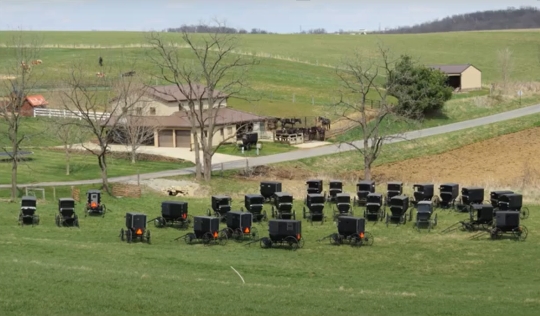The Amish & Special Needs Children
How do Amish deal with special needs children? We’ve often had questions here about how Amish approach individuals with disabilities, and children in particular.
I confess the meaning of “special needs” has never been totally clear to me. From what I understand it can cover a broad variety of situations, from moderate learning issues to much more severe handicaps. English society attaches a stigma to the term, which by its broad nature can obscure a person’s specific situation.
Amish views of special needs children
As for the Amish, there is quite a bit of information on how they handle special needs situations. Amish have commented on the issue in a variety of venues. John Stoltzfus recently presented the perspective of his community, noting among other things that “it is still a general consensus within our community that a Down syndrome child, slow learner child or any child is a Blessing from God.”
There is also at least one publication giving voice to families of special needs children. Below is a photo of two issue of Life’s Special Sunbeams. The reader who sent it in comments:
Special Needs Children are viewed as gifts from God by the Amish. It is considered a blessing to have such a child and though difficult one can learn much by caring for such a child. “Life’s Special Sunbeams” is an Amish publication containing stories from parents and teachers of special needs children.

The authors of The Amish Way: Patient Faith in a Perilous World describe Life’s Special Sunbeams:
Parents of children with Down’s syndrome, autism, deafness, dwarfism, muscular dystrophy, and other disabilities publish Life’s Special Sunbeams, a newsletter that is distributed nationally. In it, parents share essays in which they describe their challenges, exchange ideas and insights, and often reveal their heartaches. Threading through all the stories is a belief that having such a child, despite the difficulties it entails, is firmly embedded in God’s larger purpose for the world (p 167).
Sharing stories is no doubt one way of coping and helping families with special needs children. But what about the classroom?
Amish and special needs education
Amish also have more formal educational tools to help special needs children. The first Amish special education schools were opened in Lancaster County in the 1970s, followed by similar efforts in Indiana and Illinois.
Special needs children may be taught by Amish teachers–the daughter of a friend of mine is a full-time teacher of three special needs students this year–or in English settings. One reader observes:
I was a special needs teacher, in Central PA, and I had an Amish boy, who had severe cerebral palsy. He had a top of the line electric wheel chair and a computer to help him communicate, and he went to the school districts special education classes. In my experience, Amish and conservative mennonite don’t shy away from medical intervention and special needs education when it will benefit the child.
Karen Johnson-Weiner addresses special needs schooling in her study of plain education Train Up a Child: Old Order Amish & Mennonite Schools.
In the mainstream Holmes County Amish settlement, she finds that a number of schools provide regular special education classes. Amish children with such needs may be transported to a school providing a special education class (Train Up a Child, p 120).
One informant estimates there being “16 or 17 Special Ed classes throughout Wayne and Holmes Co” (p 265 footnote 12). In one teacher’s school, special education students are included in school-wide activities, participate in games and prayer, and receive discipline like other children (p 121).
Some Amish teachers’ meetings also address special needs issues. Johnson-Weiner shares a former teacher’s words at a “Special Needs Session” of a teachers’ meeting in Canada: “‘Every child has special needs, but also has basic needs that should not be neglected. These are the need to be accepted, loved, and be made to feel a part of'” (p 120).
Perfect situation?
Do Amish special needs children always find themselves in ideal circumstances? While the above is probably a pretty fair overview of the ways many Amish approach special needs children, an individual’s experience, as with anything, may vary.
One reader commented on challenges he’s seen faced by special needs individuals in Amish and Old Order Mennonite families:
…usually special needs children are integrated into the families. I had an aunt who was pass[ed] from one family member to another. She was given the opportunity to contribute to whatever extend she could. Beyond that she was looked after by family and made to feel accepted and useful or at times pitied.
A greater problem occurs for those who manage to fend for themselves. Their struggles are mainly ignored and never talked about. If it can be ignored then it does not exist. This is a very sensitive and painful issue for me.
I’ve had limited direct experience with special needs people, but I’d imagine pitying and/or ignoring someone can also be a response, maybe a not uncommon one. Are special needs children ever teased by other Amish children? Children being children, it probably happens enough.
It should also be noted that plainer and more traditional groups may also have less access to, or acceptance of, resources designed to help special needs children and adults. While special needs issues have in general received increased attention, just as with many other issues in Amish society, there is no universal approach.
Blunt talk about special needs
English people sometimes struggle to talk about people with disabilities. Interestingly, one reader observes that there seems to be less of the squeamishness about special needs issues among Amish:
In my experience with the Amish, I always find it interesting how they bring up others challenges from the start. They might, at introductions, explain that a couple has sixteen children, or two sets of twins, or three in diapers. They always point out those types of exceptions, including children with disabilities. For example, it would sound something like this: You haven’t met my neighbors, the Millers? He is a farrier and they have eight children, one girl is a “special needs.” Or: “The woman who sat in front of us today has a son with downs syndrome.” Or: “Their oldest child is in a wheelchair.”
I have never been able to detect anything less than love and acceptance of more challenging situations, however, the Amish seem quicker than the English to identify where others “have their hands full,” which is a term they use often. It seems like that sort of information is typically withheld and is only gradually revealed in the English world, instead of being what is often the identifying factors of Amish families. I think it’s just that – ways to distinguish other families in the community.
Maybe being able to address the problem head-on is a healthier way to approach special needs situations? The authors of The Amish Way reflect on the way special needs individuals are integrated into Amish families and communities:
Because children and adults with congenital disorders and other disabilities live at home and find work within the community, they are an ever-present reminder to those with whom they live to slow down or modify routines and expectations, and to include those with different abilities in the tasks of everyday life. Amish people are frank, often blunt, when they talk about disabilities, with little of the professional vocabulary found in polite quarters of modern society. But the belief that God places special children with specific families fosters remarkable inclusion. Amish-published directories of those with disabilities typically list an occupation–from store clerk to “help around the house”–alongside each person’s name, no matter how severe the person’s limitations. This underscores the conviction that everyone has something to contribute (p 168).
There is much more that could be said on this topic, but I hope this is a useful start for anyone interested in the subject.







Special indeed
I like the way the Amish think of special needs children as “special” blessings. We English seem to feel sorry for parents of special needs children and wonder why God would place this burden on good people. My sister has a special needs child. He is indeed “special” in many ways.
Special needs Children
Debbie that is well said. For many years I worked with special needs children and they are a blessing. Unfortunately for some they require a lot of looking after and cannot communicate with their care givers, this, then is hard for both parties.
ADHD among the Amish
I work withing the ADHD community at the largest family-based support organization and see daily the struggles of coping with a hidden cognitive disability. De-stigmatizing and educating the non-ADHD community is a constant struggle (especially if you’ve seen some of the recent media coverage).
My question is how is ADHD addressed in the Amish communities? Is it still seen a a “moral issue” or is it recognized as a medical disability that can also be treated (education on ADHD, behavioral management, medication when needed)? In the years that I have been working in the ADHD community, I know I’ve had one question come from an Amish family.
When the disability is not easily recognized (ADHD, learning disabilities, mental health issues), do families and communities still see these challenges as a blessing? In our own community (the Englishers), there is a lot of rejection. Do our counterparts among the Amish have the same level or frustration and rejection?
I know I’m asking more questions than commentary, but this is something I’ve wondered for a while, especially since I’ve done some outreach to under-served populations in the past.
Thanks
Karen
Amish and mental health
Karen, some good questions, which I’m not really qualified to address in much detail, though I appreciate Stephanie’s contribution below, if you haven’t seen it yet. I might say that lacking a firm diagnosis it may be hard to accept say lethargic behavior, moodiness or other symptoms that might be associated with some of these conditions. Especially so in a culture where a healthy person is one who is productive, and just getting to work and being productive along with, importantly, prayer and getting right with God may be seen as a cure for emotional and mental ills.
I have an Amish friend that does a lot of mental health work and is conscious of the idea of the mind being another part of the body that needs to work well. You also see the mental health issue addressed in some Amish publications and being talked about in more clinical terms which may not have been the case in the past, when it was probably more often addressed as being primarily a spiritual issue (though that is still emphasized).
There are a number of professionals that do work with Amish and other Plain patients. Some of the mental health treatment centers such as Rest Haven in Indiana and Green Pasture in PA cater to Plain patients and some even have largely Plain staff.
I helped a Amish friend with lunch at her chidren’s school recently. We ate there also and I spoke to some of the teachers. There was a special class just for students with learning disabilities. This teacher (Amish) actually has special training about dyslexia and ADD and she said she read every book she could get her hands on! I was shocked! My son has severe dyslexia. We home schooled him and had to bring in many tutors to help us. After help he was a straight A student. I was touched by the enthusiasm this teacher had for these students!
“Amish people are frank, often blunt, when they talk about disabilities…”
I wish more English would do the same, rather than “tip-toe” around a child’s (or adult’s) obvious “challenges”. It would seem to be more inclusive of the “special needs” individual, and at the same time, helps the other person to understand that they may need to adjust their attitude or actions, as related to this special needs person in their midst.
In our library, it’s definitely appreciated when parents who sign up their school-age children for programs let us know that “Connor has ADHD,” or “Melanie has a learning disability.” While we’re not trained experts, we do try to adapt programs for the children, or sometimes we suggest the parent stay to help their child.
I learned a long time ago that special needs children usually have some pretty special parents & family supporting them; their special child was born into that family because (usually) s/he needed to be raised by them, because of their love and acceptance and adaptability.
Alice Mary
As others have commented, many times illnesses or disabilities can not be seen. I met an Amish gentlemen several years ago. When I made my purchases, he did not look at me or even thank me. I didn’t know if he didn’t acknowledge me because I was a woman or if it was something else. I met another Amish gentlemen a few years later and as we visited, I told him my experience. He knew whom I was talking about right away. He said he suffers from Bipolar Disease and had been in a state of depression at that time. He apologized for his behavior (it wasn’t necessary but he felt he needed to apologize for him). He said that an Herbalist had been trying to assist with his symptoms but they were not seeing much improvement. He said that his family has tried approaching him on many occasions and hasn’t been able to reach him. He also said that the “Big Guns” had been out to their place several times. I imagine he’s speaking of the police being called to help calm the situation. I haven’t been to that community for a few years now and I’ve wondered how that gentleman is doing (he’s actually their Bishop).
Amish & Bipolar disorder
I have encountered something like this just once before. I have no idea what the case was, but the person seemed unable to communicate. The incidence of bipolar disorder is higher among some Amish particularly in Lancaster County. Amish are a very well-suited group for genetic studies. This is an article about one such study on bipolar going on now:
http://www.ldnews.com/announcements/ci_22311901/abram-hostetter-studies-bipolar-disorder-amish
“The Old Order Amish of Lancaster County have a lower incidence of mental illness than the general population, but a much higher incidence of bipolar disorder,” Hostetter said.
Bipolar disorder, also called manic depression, often leads to suicide.
“It’s in the blood,” said an Amish grandmother – or siss im blut, in Pennsylvania German – when Egeland began her research.
Thanks for the link. I’ll have to read that. Very interesting that there’s a higher bipolar rate among the Amish. It is genetic so that explains some of it. The gentlemen really gave me a bad impression of his community and I’m glad I returned and was able to find out why he was unresponsive. The other gentleman I spoke with also said he’s hard of hearing so that probably contributed too. I really hope that he’s being treated and that he has minimal symptoms. I worry about his family and the entire church that he leads.
The Amish & Special Needs Children
I am the father of a daughter with cerebral palsy who has her masters degree and now works with “Special Needs Children”. The rewards and struggles of parenthood has been a part of my life for over 40 years. An Amish friend of mine has 15 children, two of them have cystic fibrosis. While I feel that all children are gifts from God, I still question the necessary role that humans have in minimizing genetic conditions. God is in control, but he gave us brains and I think that he wants us to use them. Too many folks in insular societies marry too closely related relatives and the results can be painful. Both myy faith and be a student of science causes me to question life on a continual basis.
Tom
Amish pre-screen for genetic conditions?
Tom and others I appreciate you sharing. You raise an interesting point about minimizing genetic conditions. With Amish participating in genetic studies I wonder if there will ever be a point where potential Amish marriage partners pre-screen for possible genetic issues as is done in some societies.
I doubt it for a number of reasons, but perhaps active participation in and support of the science and the work that geneticists and specialists are doing with the Plain communities may lead some to take the next step and consider it. Though that would seem to be taking things out of God’s hands in a major way.
Special Needs Children
I asked my son, Mark, who is Amish about this. He said that special needs children are dealt with in several ways. There are three Down’s Syndrome persons in the community and one very slow learner. Two of these are now of an age that they are out of school. The other is just starting school. He has his own Amish teacher who, for years, has worked with slow learner children. She, also, had experience working in Virginia in a residential facility for mentally retarded children.
As far as hyper-activity and ADHD the Amish are not so apt just to jump on that and start the children on medications. They try changing the child’s diet. Restrict sugars and junk foods, etc. They do enforce discipline and hard work. Mark said that you would be amazed how much the effects of ADHD are diminished just by keeping the children busy at tasks that they can do to help out around the house. Also, the parents expect the children to mind. If all else fails, they may resort to medications but it is indeed a last resort. Mark doesn’t know of any children in his community that are on ADHD meds but he wouldn’t say it was impossible. He said that he can remember from when he was teaching that many parents out in the English world didn’t have the patience or didn’t want to take the time to teach their children discipline and hard work. It was so much easier just to pop a pill in their mouths. Any misbehavior in class wasn’t because the child needed discipline it was because they had this or that disorder and needed another pill. Mark isn’t saying that there aren’t cases where medications aren’t warranted but he feels that many modern day parents have replaced parenting time and skills with trying to medicate the problem.
Don I really appreciate Mark’s perspective on this sort of thing, which is probably close to if not unique among Amish, as someone who is Amish who also taught 30 years in public schools as an English person. I would think Mark’s voice has a particular weight on certain matters.
Prairie View Press, phone 800-477-7377, sells a book, GOD’S SPECIAL CHILDREN, compiled by Jacob R. and Anna Mast. The book has over 130 stories written by parents or siblings of children who are developmentally challenged, with 552 pages, printed by Schlabach Printing of Sugarcreek, Ohio. Here’s the link:
http://www.prairieviewpress.com/products/God_s_Special_Children-571-62.html
Dr. Morton heard an Amish boy’s grandfather say, “Special children teach a family to love. They teach a family how to help others and how to accept the help of others.” (dhm, From The Death and Life of Enos Fisher). From http://blogs.law.harvard.edu/mhhyoung/2008/08/22/the-clinic-for-special-children/
The Amish & Special Needs Children
Hi, I’m new to this, but I have been reading a lot about Amish people, their approach on SNC is fantastic as I have a daughter with Asperger’s Syndrome, but sometimes she doesn’t like to be ‘tagged’.We do tend to treat them differently. I’m learning quite a lot already from The Amish
Special Needs
I have worked the past 14 years with special need children. I am taken very much by the way the Amish handle and feel about their children with special needs. Over the course of my work with many different kids and families the one thing that I have learned is that each child is a blessing and we should ask ourselves what we can learn from them and what we can always teach them.
Blessings,
life's special sunbeams
I was wondering how to subscribe to the publication, Life’s Special Sunbeams. My grandson has autism and we would like to hear other people’s ideas. Thanks in advance
Life's Special Sunbeams Amish special needs publication
Hi Jan, I know a couple of readers here have already subscribed to Life’s Special Sunbeams. This is the subscription information you need, courtesy of a reader who checked directly with the publisher. Hope you find it helpful.
To subscribe:
Life’s Special Sunbeams
212 Hershey Church RoadKinzers, PA 17535
UPDATE May 2014: New Address
66 Cherry Hill Rd.
Ronks, PA 17572
$20 US per year (Canadian price is $25 per year U.S. funds)
Allow approximately 6 weeks for new subscriptions.
thanks so much. Our family appreciates your help.
Amish Special needs Children
Hi, I have a 15 year old daughter who has been diagnosed with traits of Aspergers Syndrome. I love the way the Amish are towards disabled children. I am English, and in this country they are either do not acknowedge a problem or it can be the complete opposite and our children become wrapped up in cotton wool! My daughter is out of school because her school plus education welfare won`t acknowledge her problems, it`s been an absolute nightmare. I love this site, it`s so informative. Thank you
Update: Life's Special Sunbeams address change
If you’re interested in subscribing to Life’s Special Sunbeams, I’ve just been informed there is a new address: 66 Cherry Hill Rd., Ronks, PA 17572
Thanks for the article, Erik. I am finally going through my newsletter emails to catch up on what I have been missing. Very good stuff here.
God's Special Children book
A paperback book, “God’s Special Children” was written by Amish Benuel M. Fisher of Lancaster County, PA, in 2012. Most of the 186-page book details the story of an Amish boy, Marlin Riehl, with Glutaric Aciduria type 1 (GA-1), a genetic disorder. The remaining chapters portray the Millers, Allgyers, Glicks, and Hoovers. Throughout the well-written book, Dr. Holmes Morton is mentioned. “What a grand doctor!” His Clinic for Special Children is pictured inside the covers. My copy was purchased through a display of Lantern Books of Lebanon, PA.
These sentences stood out to me:
-“The looks of his old auto told Susie that this was not one of those doctors chiefly out for money.”
-“How can it be that someone has finally found an answer to our heartaches?”
-“What a wonderful servant God has sent for future babies.”
-“Holmes Morton, like his fictional namesake Sherlock Holmes, had cracked the case.”
-“God heard my prayers. I’ll try my best to be his servant.” “Without God, I would not have succeeded.”
-“Well, if I never had a special child, I would not know what to say to someone who does have one. She realized that not all have the same talents for expressing feelings and care for others.”
-“Let everyone rejoice for those who spend their time in working with God’s special children. Their rewards are far more than huge paychecks. The interaction touches a spot in their hearts.”
vernacular
Love the article! I have two children with special needs, so the topic is close to my heart. I would add one thing… there is a move towards saying “Children with special needs” as opposed to “Special needs children”. This may not seem like a significant difference to most people, but it means a lot to many within the special needs community. They are children first 🙂 and children with a special need (or two, or more) second. It’s humanizing, and tends to put things in perspective/ order of importance.
Children with special needs terminology
Thank you Jennifer for sharing this.
I’m sure the term you suggest would be more soon used among non-Amish than Amish, who generally tend to be more blunt and less politically correct or delicate in the way they describe things and people (at least that’s how it sounds to our ears; to give one example, “old maid” is still a term in use by the Amish).
I can see the rationale for preferring “children with special needs” to “special needs children”, a subtle but real difference as you explain.
For those interested, there is a new article about special needs education among the Amish, including interesting commentary from Mark Dewalt, author of Amish Education in the United States and Canada:
http://www.religionnews.com/2015/05/11/inclusion-is-important-in-amish-special-education/
Children with special needs can have a wide variety of needs, but depending on the community and the individual child, the Amish typically educate their children with special needs in several ways.
Children might be sent to special needs facilities in a public school, to an Amish schoolhouse with a separate room for children with special needs, and rarely, to an Amish school entirely for special needs children. Like the Yoder children, a mobile therapist may visit special needs children.
Dewalt said he has witnessed multiple Amish classrooms incorporating children who are partially or entirely deaf into the regular classroom. And, he said, in these classrooms all the children learn American Sign Language to communicate, not just the students with special needs.
“So, now that child can feel included,” said Dewalt. “The Amish have always been an inclusive type of group where nobody is more important than the other.”
Special children book
There is a book called “Blessings in Disguise” a collection of stories about Special children in Holmes Co. that attend the Holmes Co. Training center.
Available from :Andrew Yoder
6440 S.R.515
Millersburg, OH 44654
Special Needs Children
I was raised in an Anabaptist faith similar to the Amish. We accepted people for who & what they were. 31 years when my youngest was born with a genetic defect I was determined that she was to be raised the same as her sister with love, hard-work, rules and consequences.
Over the years, I’ve had to stop people from ‘babying’ her simply because she is ‘special’. I have been told both that I am so strong for ‘dealing’ with her and that I am too harsh with her.
I consider her an extra special gift from God. I had her name decided before she was born and only after we found out she had issues did I discover her name means Bringer of God’s Joy.
Abigail certainly is does bring our close & extended family much joy and she has grown into a loving & compassionate person who is very eager to help, sometimes to the point of of being ‘too’ helpful.
Thank you for this article which has given me a small glimpse into the Amish and how they accept those that are not ‘perfect’.
funding for medical equipment
I work with an Amish child with severe cerebral palsy. He lives in a rural town in Potter County and attends a public school in a special education classroom setting. He receives therapy services through the school district and uses many devices for position and mobility. In the past most of his equipment was donated by local families or Shriners, but he has outgrown most of it. The new equipment is expensive and we are having difficulty finding funds to pay for it. We are looking into local organizations to assists with the coast or donations to provide the necessary equipment (wheel chair or stander) to help this child. Are there any programs in the Amish community that can help?
Hi Beth, which state are you in? Have you approached the local Amish community about this either directly or through the boy’s parents?
Life's Special Sunbeams
I’m interested in subscribing to Life’s Special Sunbeams, I have two sibling with muscular dystrophy. Do I send them a request with money in the mail or is there another way of contacting them? And is there an even newer address?In the Lancaster County Business Directory it says their location is 850 S Custer Ave, New Holland, PA.